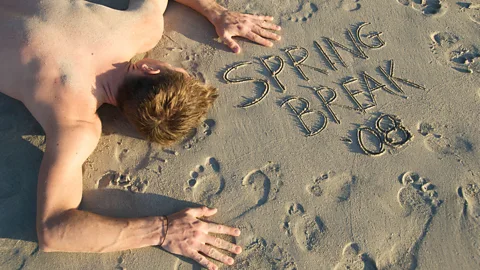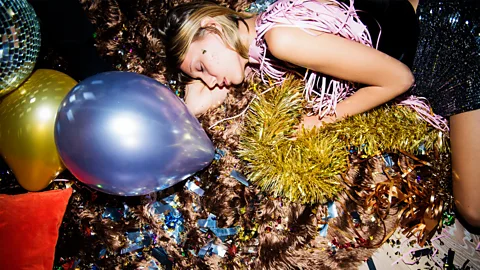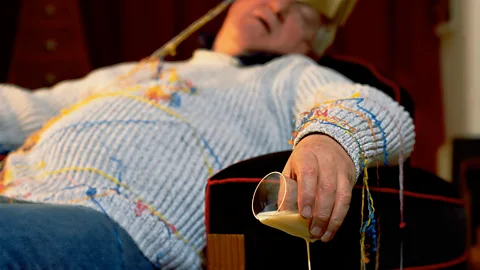Six boozy facts to help avoid a hangover
 Getty Images
Getty ImagesFrom red wine headaches to mixing drinks, here's what to know about hangovers ahead of New Year's Day.
Bouts of amnesia, throbbing headaches, extreme lethargy and nausea that's cruelly combined with overwhelming hunger – when you list them out, the symptoms could describe a terrible new medical condition. But of course, this is just a classic hangover.
After a night of consuming humanity's favourite toxin, as dawn breaks across the globe on New Year's Day, millions of people will awake with a groan and a feeling of nagging curiosity about exactly what they got up to the night before. To help others through this annual alcohol-induced reckoning, we have nobly curated some key findings about hangovers, from the folk wisdom that's genuinely backed by scientific evidence to the surprising power of expectation.
Red wine headaches are real
Red wine has a bad reputation when it comes to one particularly annoying symptom some people experience after drinking: headaches. Even the Romans were compelled to queasily list the bad effects of a red wine headache more than 2,000 years ago.
The active, ouch-inducing ingredient has long thought to be compounds such as sulphites – but white wine contains just as many of them, and there's some evidence that it doesn't cause headaches to the same degree.
The culprit may in fact be a compound called quercetin, found in abundance in the skin of red grapes, according to recent research by scientists at the University of California, Davis. It's thought that quercetin disrupts the normal processing of alcohol in certain people.
 Getty Images
Getty ImagesThe ethanol in alcohol is normally converted to acetaldehyde in the body, which the enzyme ALDH coverts to acetate. It’s not always the type of alcohol to blame, sometimes it's down to individual differences in the way our bodies metabolise alcohol. Some people have enzymes that don't process this as efficiently, and the levels of noxious acetaldehyde build up, causing those famous red wine headaches.
…but red wine might have some upsides
The belief that the occasional tipple of red wine could be good for us goes back to the 1970s, when research showed that French people were less likely to have heart disease than other populations, despite their high intake of saturated fat. Known as "the French paradox", it's still puzzling researchers today.
Afterwards, researchers believed it was actually less healthy to abstain completely from alcohol than it was to drink moderately. But now it's thought that data may be flawed – biased by the fact that some people may abstain from alcohol because of other health issues.
Further research has tried to find out if alcohol really is a silver bullet against heart disease. A study in China showed that the more people drink, the more likely they are to suffer from high blood pressure and risk having a stroke. But there is a silver lining too: while the risk of strokes goes up, heart attacks apparently don't. Something in alcohol may make protect us from them. Worth, perhaps, mulling over, if not over a mulled wine.
Expectation can get you drunk with less
How people react to alcohol can be unexpected. Some people tend to become wild, an unfortunate minority become sad, and others are chatty – some are even inclined to turn a little obnoxious. As the author David Robson explains in his book The Expectation Effect, the effects of alcohol are not purely chemical – in fact, powerful social expectations can shape the way we respond when we drink.
In one famous experiment, researchers gave volunteers drinks that they said had a lot, a little or no alcohol, then introduced them to a "participant" planted to be deliberately rude – and asked them to season a dish with hot sauce and salt for them to eat. Those who believed they had drunk the most alcohol served dishes spiked with significantly more hot sauce.
However, expectations could also be harnessed for good – such as to reduce the severity of drinking, and consequently (hopefully) the hangover. In another study, people who were told they had drunk vodka mixed with the energy drink Red Bull felt more drunk than those who were informed they had been given a "vodka cocktail", or "exotic fruits cocktail". Those with the belief that mixing alcohol with energy drinks can get you more drunk experienced the biggest increase in drunkenness. It could be one way to have some intoxicating fun while keeping the actual amount you drink to a minimum.
Acetaldehyde: a chemical that might make us feel terrible
In 2023, 173 million adults aged 18 and older in the US alone consumed the precursor to a potent carcinogen: alcohol. When alcohol is metabolised by the liver, the first step is to turn it into acetaldehyde – a chemical capable of causing permanent damage to the body's DNA. This carcinogen is thought to be one of the primary causes of alcohol-related cancer – but there's also evidence that it might be at least partly to blame for some of the symptoms of a hangover.
The myths of mixing drinks
According to popular wisdom, not all alcoholic drinks are created equal – at least in terms of the severity of the hangover they cause. And there are certainly some differences in the substances that alcohol beverages contain which can influence a hangover.
Chief among them is alcohol itself, which has a diuretic effect that can leave you dehydrated if you don't drink enough water alongside your booze. We also know that heavy drinking can result in poor quality sleep and leaves us less likely to get the rapid eye movement (REM) shut-eye we need to feel fresh in the morning.
And the higher the alcohol content of a drink, the easier it is to drink more of it in a short space of time, especially if you are having cocktails that mask the taste with flavoursome mixers.
Our bodies usually can usually break ethanol down into acetaldehyde quite quickly, before it is further converted into acetic acid. People who have a genetic variation that means they can't break it down, and so have elevated levels in their blood after drinking, tend to suffer more severe hangovers.
 Getty Images
Getty ImagesThere are other substances lurking in your favourite tipple that can also contribute to how rough you feel the next morning. And they help to explain why certain beverages can leave some of us feeling worse than others.
Chief among these are chemicals the beverage industry calls congeners, which are produced during the fermentation process. These include substances such as acetone, fusel oil and tannins, which give darker drinks such as whiskey and red wine their colour and astringent taste.
Bourbon whiskey, for example, contains 37 times more congeners than vodka. Studies have shown that people who have a big night on bourbon tend to feel a more severe hangover the next day than those who drink vodka. However, it is worth noting that the effects of congeners on a hangover are outweighed by those of the volume of alcohol itself.
One randomised controlled trial has even examined two popular drinkers' adages – "beer before wine and you'll feel fine; wine before beer and you'll feel queer", and "grape or grain but never the twain". It found that mixing the two in any order didn't seem to affect the intensity of a hangover. Again, it was the level of intoxication that was the most reliable predictor of hangover severity. And if you are mixing drinks, it is perhaps more likely you are already drinking more.
So while moderating the total amount of alcohol you drink will be most effective at avoiding that hangover, it might be best to lay off the dark stuff if you are having a few.
Read more about whether mixing drinks affects a hangover in this article by Claudia Hammond.
Don't rely too much on hangover cures
There are no shortage of alleged quick fixes to get rid of a hangover. In ancient Egypt, for example, people were advised to wear a necklace made from the leaves of a shrub called Alexandrian chamaedaphne, while the ancient Romans suggested eating fried canary.
Others swear by a plate of greasy food after a night out or a hideous concoction known as a Prairie Oyster – a mixture of raw eggs, tomato juice and hot sauce. But in truth, hangovers are generally not caused by a nutritional deficiency.
One review of randomised controlled trials examined eight different purported hangover cures, including extracts from borage, artichoke treatments, yeast extract, prickly pear and fruit juices, along with several drugs. None showed any ability to alter the course of a hangover. Tests on other cures have also had mixed results, with some helping with a few of the symptoms, such as tiredness and nausea, but none were able to address all of the symptoms relating to a hangover. Korean pear juice, for example, seemed to work in people who have a genotype that already leaves them less prone to severe hangovers.
 Getty Images
Getty ImagesIt is often suggested that eggs can help with a hangover due to being rich in an amino acid called cysteine, which can bind to acetaldehyde and neutralise some of its effects. But as the role of acetaldehyde itself in hangovers is questionable, the benefits might not be that great. Indeed, one study that gave participants a cysteine supplement found there was little improvement in their hangover scores (although it did find women benefitted more than men, intriguingly).
In many cases, however, the quality of the research in this area itself is poor, meaning drawing firm conclusions is difficult. Relying upon people's self-reported experience of a hangover can be confounded by other factors, and asking them to draw comparisons with previous hangovers is prone to bias. It's perhaps best not to place too much hope in some quick fixes the day after.
Conversations with friends can influence how much we drink
Our decision to drink more during social occasions is often driven by the behaviour of our friends and family. Our brain is constantly picking up on cues from other people to inform the way we act.
"Anything our friends do influences us in ways that we are conscious of or not. Their presence can decide whether we act on that health information or ignore it," says Christin Scholz, assistant professor in persuasive communication at the University of Amsterdam in the Netherlands.
In a 2019 study, Scholz asked students in the US whether they had spoken to anyone about their recent experiences involving alcohol, and whether those conversations were positive or negative. They drank more alcohol the next day if they had a positive conversation, while sharing negative drinking experiences with their peers led them to drink less alcohol in future.
"Say I have a conversation with a friend the day before about some of the negative sides of alcohol but the next day I am in a bar with other people – I would still argue that conversation has some form of influence on me," says Scholz.
Read more from the BBC about how our friends change our habits - for better or worse.
So, the best way to avoid a hangover? Well, it's drinking less alcohol. But there are some tricks to make this easier, such as discussing the adverse effects of drinking with friends beforehand, and playing on your expectations to experience some of the pleasant social effects you're after with less – or perhaps even no – booze. If you do have a heavy night planned, steering clear or whiskey or red wine can also help.
--
If you liked this story, sign up for The Essential List newsletter – a handpicked selection of features, videos and can't-miss news, delivered to your inbox twice a week.
